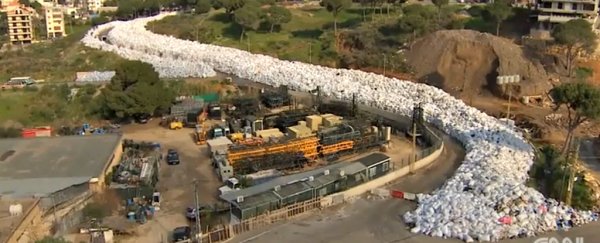A literal pile of trash is snaking its way through parts of Beirut, Lebanon's capital city, stretching for hundreds of metres and posing a threat to both human health and the environment.
The 'garbage river' has been building up since July last year, when the city's landfill site was shut down. But since then, no alternative has been identified, and the problem doesn't look like it'll be fixed any time soon. The Lebanese government has failed to pass a budget since 2005, and the office of president has been unfilled for more than a year.
The river of trash started as an unofficial dump outside a residential building in the suburb of Jdeideh, but as the months went on, the pile has continued to grow and expand, now containing a reported 2 million tonnes of waste.
Up until last month, a British firm was planning to help outsource some of the trash to Russia, but the paperwork wasn't completed in time and the deal has fallen through.
Although the snake of trash is the most eye-catching garbage formation, unfortunately, it's not the extent of the problem in Beirut, with locals now having no choice but to shovel rubbish along the sides of roads and into rivers, where its toxins can leach into water ways.
Locals describe the smell as "putrid" and "indescribable" - and this is still in the winter months. Once summer arrives, the decomposition is only going to get worse.
But the environmental damage of the waste isn't the only concern. Residents have been warned against burning the waste because of the toxic gas it can release, but with few other options, many have resorted to doing just that.
This has triggered a spike in respiratory infections - admissions at one local hospital have gone up 25 percent since the previous year, Tech Insider reports.
Locals have now started protesting against the lack of government help to clean up their streets, with some of the demonstrations turning violent. "This used to be such a beautiful place, but look at it now," a resident told CNN. "We can't even walk by it."
The government has also struggled to provide reliable water and electricity over the past year, with the refugee crisis from the war in neighbouring Syria putting extra strain on the system.
According to Inhabit, a spokesperson from Lebanon's Council for Development and Reconstruction said they currently had no solutions, but were working on the issue.
They're not the only city with a waste issue, the Chinese city of Shenzhen has recently announced that it's building a waste-to-energy plant to burn a third of it's trash each day - which isn't the ideal environmental solution, but it's certainly better than nothing.
With cities and researchers around the world currently looking into more innovative ways to get rid of their garbage, let's hope that Lebanon finds something that works for them soon. Because a major city drowning in waste is a city on the verge of a health crisis. And that's the last thing the region needs.
